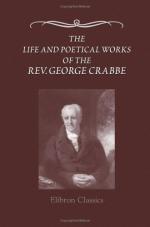|
This section contains 6,119 words (approx. 21 pages at 300 words per page) |

|
SOURCE: Edwards, Gavin. “Crabbe's So-Called Realism.” Essays in Criticism: A Quarterly Journal of Literary Criticism 37, no. 4 (October 1987): 303-20.
In the following essay, Edwards addresses previous criticism that focuses on the concept of realism in Crabbe's poetry and asserts that the subject is more complex than is traditionally acknowledged.
George Crabbe, Hazlitt insisted, ‘is a fascinating writer’,1 but the books written about Crabbe have not been fascinating. All the good things on him are short: essays, chapters or paragraphs. When Crabbe's critics venture beyond brevity something depressing happens, and that something is ‘realism’ or its associates, ‘truth’, ‘fact’, ‘the actual’, ‘the literal’. The concept of realism has dominated and depressed the discussion of Crabbe not only by literary critics but also by social historians, who from Dorothy George to Lawrence Stone have rifled his poetry for descriptions of English life in the eighteenth and early nineteenth centuries. It is...
|
This section contains 6,119 words (approx. 21 pages at 300 words per page) |

|


